Biden remains strong in polls despite lack of in-person events
Biden slowly resuming activity on campaign trail; Peter Doocy reports.
Democratic presidential candidate Joe Biden continues to lead President Donald Trump in the race for the White House, as majorities say racism, unemployment, and coronavirus pose a major threat to the stability of the country, according to the latest Fox News Poll.
Biden supporters are far more likely to say fear that Trump might win is behind their vote choice (63 percent) than to say it is enthusiasm for Biden (31 percent). The opposite is true among those backing Trump, as almost twice as many of his supporters say enthusiasm is the motivation (62 percent) rather than fear Biden could win (33 percent).
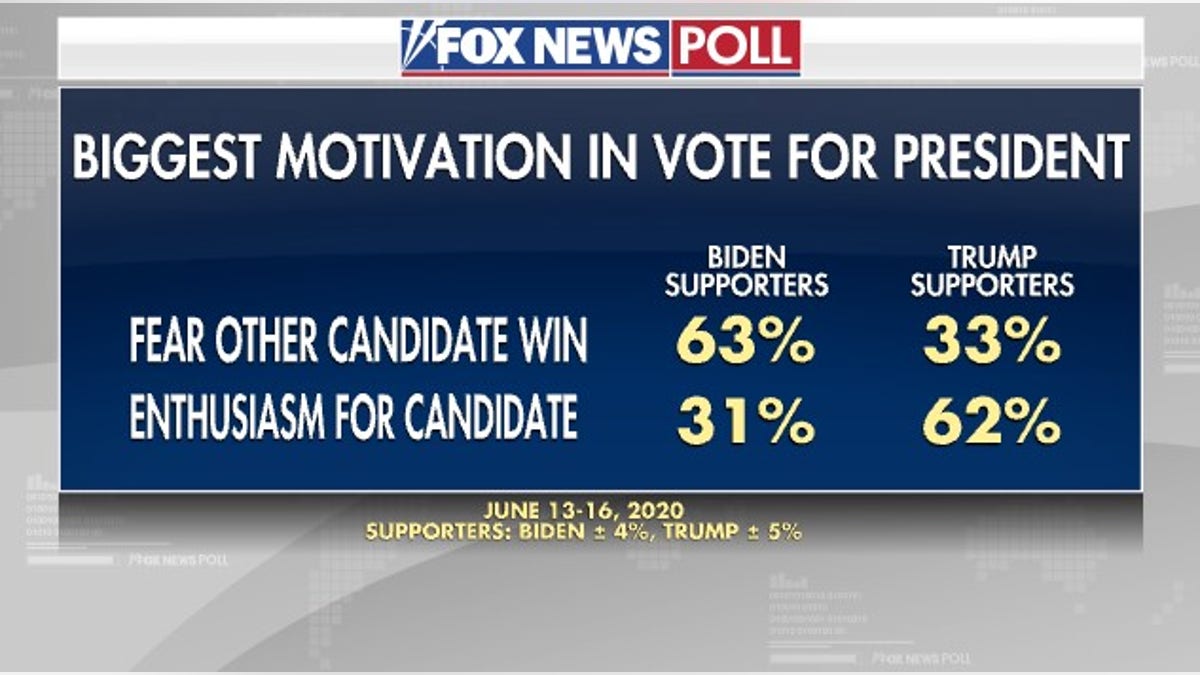
Fear is a big factor when it comes to turnout, and that could help Biden. In 2016, more of those backing Trump (61 percent) than Hillary Clinton (54 percent) said fear motivated them.
“Negative emotions like fear, anxiety, and anger, can be powerful motivators for political participation,” says Daron Shaw, who conducts the Fox News Poll with Democrat Chris Anderson. “The lack of enthusiasm for Biden, however, does create an opening for Trump to define him as out of touch and not up to the task.”
In the head-to-head matchup, the poll finds Biden leads Trump by a 50-38 percent margin. That 12-point advantage is statistically significant, and up from Biden’s 8-point lead last month (48-40 percent).
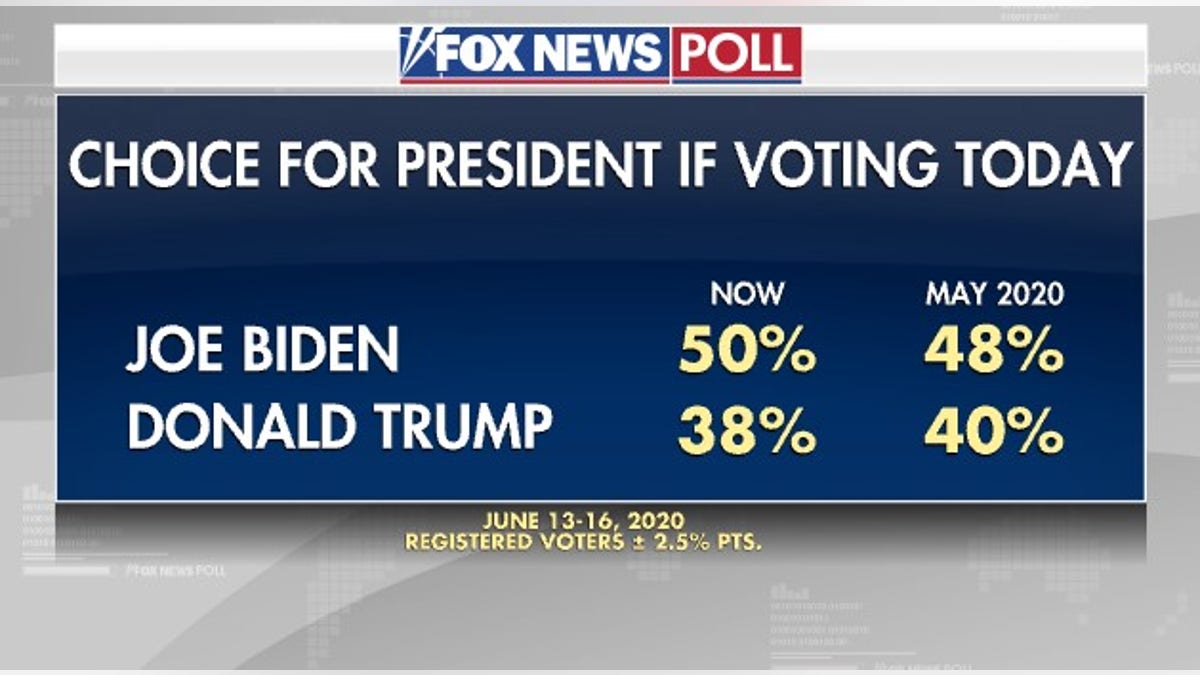
For over a year, the portion backing Trump against Biden has stayed between 37-42 percent. Biden’s support has ranged from 42-52 percent.
CLICK HERE TO READ THE POLL RESULTS
“Trump needs to expand beyond traditional Republican groups and cut Biden’s support among independents,” says Shaw. “The best news in the poll for the Trump campaign is a significant percentage of independents saying they haven’t decided or are considering a third-party option.”
Independents prefer Biden over Trump by 39-17 percent, but another 43 percent are undecided or supporting someone else.
Biden’s lead comes from the backing of black voters (+79 points over Trump), those under age 30 (+37), suburban areas (+22), women (+19), and voters ages 65+ (+10).
Trump, on the other hand, is underperforming his vote share among key groups, such as white evangelical Christians (+41 points) and rural voters (+9). In 2016, he won white evangelicals by 64 points and rural areas by 27.
Moreover, amid the COVID-19 pandemic and nationwide protests against police brutality, more voters see Biden as empathetic and respectful.
Forty-seven percent say the phrase “cares about people like me” describes Biden compared to 37 percent who say it fits Trump.
Fifty-three percent believe Biden respects racial minorities vs. 35 percent who say the same about the president.
Among black voters, most say Biden respects racial minorities (79 percent), while most think Trump does not (86 percent).
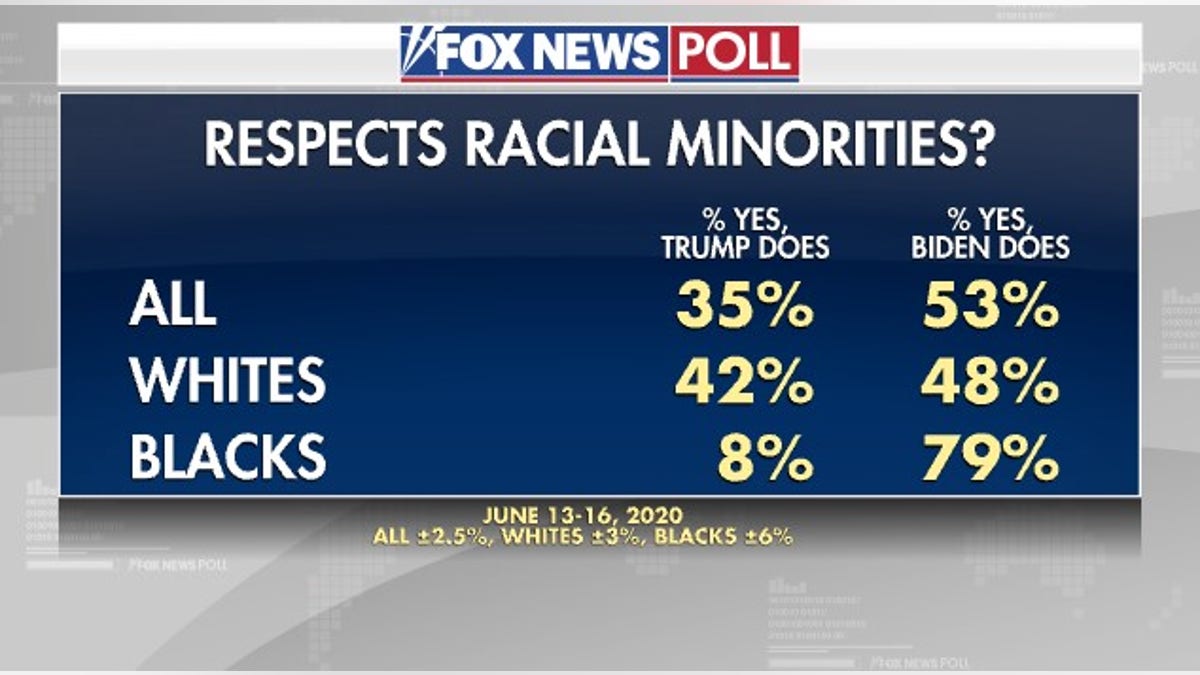
Over half of seniors (52 percent) and a plurality of women (46 percent) think “cares” describes Biden. Larger numbers of both groups say it does not apply to Trump (57 percent seniors and 60 percent women).
Suburban women, in particular, give Biden the edge on “cares” (48 vs. 30 percent for Trump) and respecting racial minorities (55 vs. 27 percent).
Plus, Biden is better liked. His favorable ratings are net positive by 9 points (53 favorable vs. 44 unfavorable), while Trump’s are net negative by 13 (43 favorable vs. 56 unfavorable).
Among voters extremely interested in the election, Biden tops Trump by 53-42 percent.
Trump’s overall job rating held steady, as 44 percent of voters approve and 55 percent disapprove. His best marks came in April, when views on his performance split 49-49 percent.
As protests continue since George Floyd’s death on May 25, a 61 percent majority disapproves of how Trump is handling race relations (32 percent approve).
That matters, as 81 percent are concerned about racism and another 64 percent perceive racism as a major threat to the stability of the country. That’s on par with the coronavirus pandemic (67 percent major threat) and unemployment (67 percent major threat).
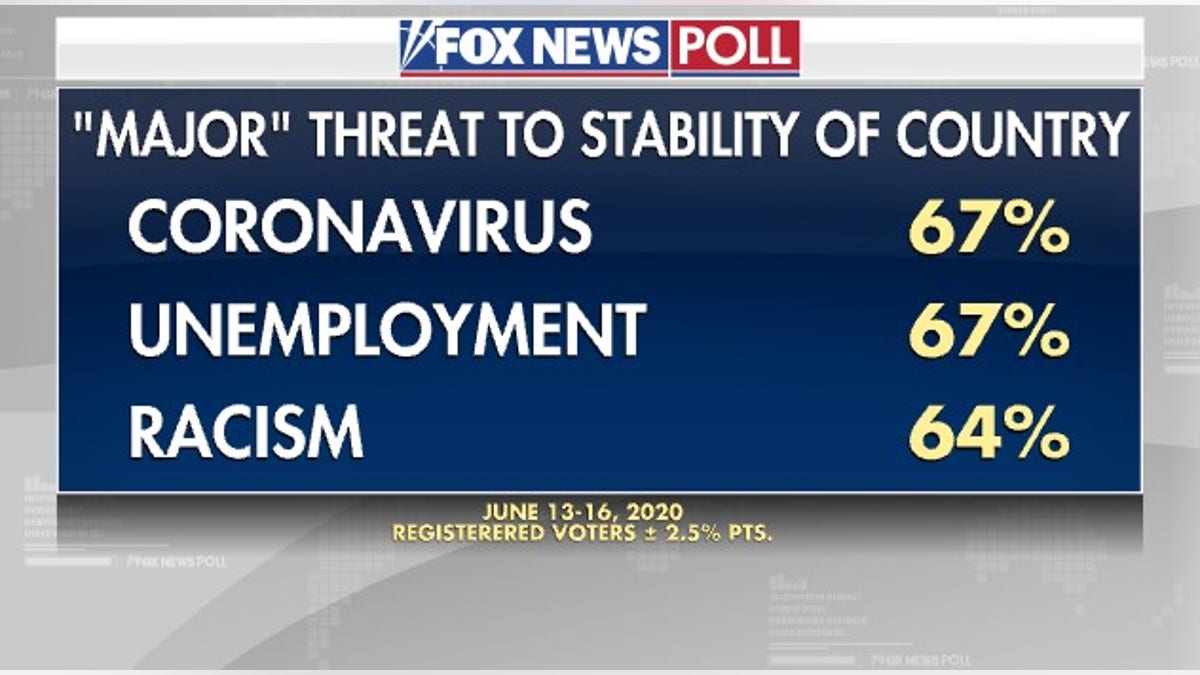
Almost all blacks (87 percent) and most Hispanics (71 percent) see racism as a major threat to the country’s stability, compared to over half of whites (58 percent). Those numbers roughly match disapproval of Trump on race relations: 88 percent among blacks, 77 percent among Hispanics and 53 percent among whites.
CLICK HERE TO GET THE FOX NEWS APP
All in all, about 6 in 10 hold positive views of the protests after Floyd’s death (57 percent) and negative views of how Trump responded to them (56 percent).
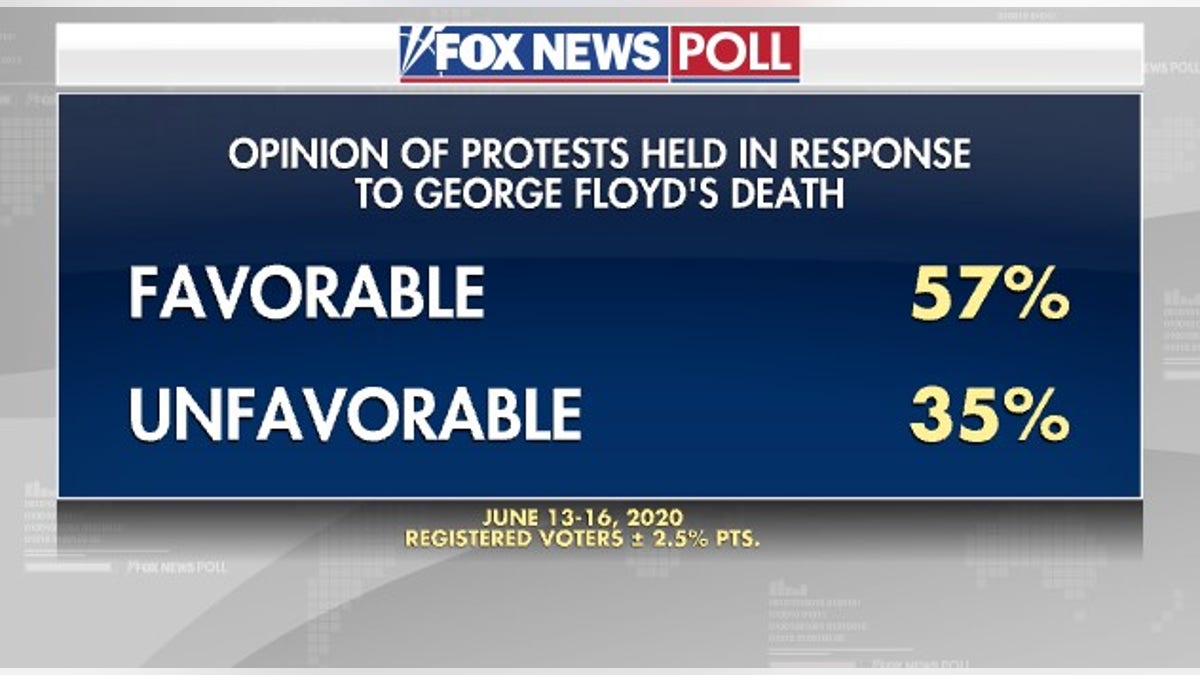
“It’s hard to believe an issue has emerged more challenging for Trump to navigate during his re-election campaign than a pandemic, but that happened with the racial reckoning prompted by George Floyd’s murder,” says Anderson.
Nearly one in five (18 percent) have participated in a recent protest, including 14 percent of whites, 35 percent of blacks, and 51 percent of blacks under age 45.
By a 13-point margin, more think police brutality against blacks is a widespread problem rather than isolated incidents (54-41 percent). There is a whopping 80-point race gap: blacks are more likely to say police brutality against blacks is widespread by 76 points, while whites are more likely to say it is isolated by 4 points.
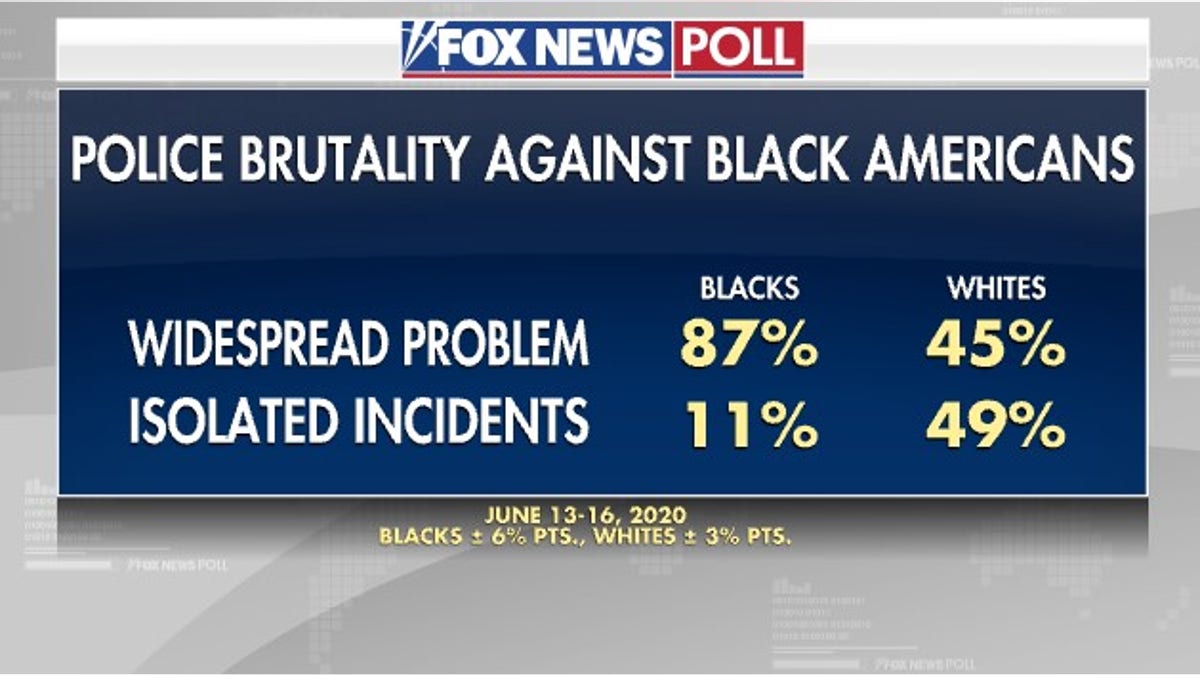
Views divide over reducing funding for police and reallocating those funds to other social services (41 favor vs. 46 oppose).
Poll Pourri
An equal number of voters (56 percent) have an unfavorable view of former presidential candidate Hillary Clinton and President Trump. Among those who dislike both of them, Biden is preferred over Trump in the presidential matchup by 63 points. And those who view both Biden and Trump negatively pick Biden by 32 points. In 2016, voters with unfavorable views of both Clinton and Trump voted for Trump by 17 points.
More Republicans have a positive view of Trump (86 percent) than of former President George W. Bush (72 percent) and former presidential candidate and Utah Sen. Mitt Romney (37 percent). In fact, more Democrats (47 percent) view Romney favorably.
Conducted June 13-16 2020 under the joint direction of Beacon Research (D) and Shaw & Company (R), this Fox News Poll includes interviews with 1,343 randomly chosen registered voters nationwide who spoke with live interviewers on both landlines and cellphones. The poll has a margin of sampling error of plus or minus 2.5 percentage points for all registered voters. The poll includes additional interviews (an oversample) of randomly selected black voters to allow analysis of the subgroup.






















